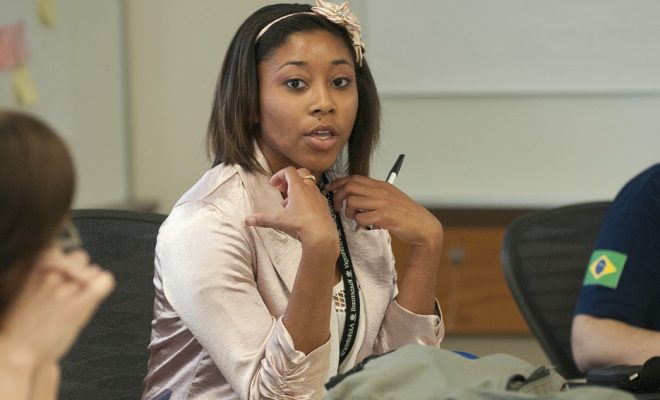Why do fewer black students get identified as gifted?

Jason A. Grissom, Vanderbilt University
Nationally, black and Hispanic students are underrepresented in gifted programs, which provide specialized instruction or other services to meet the needs of especially bright or talented students.
Data from the U.S. Department of Education show that black and Hispanic students make up 40 percent of public school students but make up only 26 percent of students enrolled in gifted programs.
So what are the reasons for this underrepresentation?
One possibility is that these disproportionately low rates simply reflect differences in academic achievement across demographic groups. Indeed, a large body of research demonstrates that black and Hispanic students lag behind their white and Asian peers even at kindergarten entry.
However, a recent study I coauthored with Christopher Redding, a doctoral student at Vanderbilt University, shows that differences in achievement are only part of the story.
The black-white gap in gifted identification
We based our research on an analysis of gifted placements in the Early Childhood Longitudinal Study, which tracked a nationally representative sample of kindergartners throughout elementary school. A nice feature of these data is that they contain standardized achievement measures in math and reading for every student.
When we took student achievement levels into account, we found different patterns for Hispanic and black students. Essentially all of the gifted assignment gap between Hispanic and white students can be explained by test score differences. In stark contrast, math and reading scores explained only a little of the black-white gap in gifted assignment. In fact, a black student with the same scores as a white student is still only half as likely to be assigned to a gifted program.
In other words, two students – one black and one white – with the same math and reading achievement could have very different likelihoods of being identified as gifted.
This is a startling finding.
And, as additional analysis in our study shows, it cannot be explained by other differences in student background, such as parental education and household income.
Our investigation of school and classroom factors, however, does point toward two contributors to the black-white gap.
The first is that black students are less likely than white students to attend schools that offer gifted programs.

A teacher’s race can influence who gets selected for gifted programs.
US Department of Education, CC BY
The second is that black students assigned to a white classroom teacher are much less likely to be assigned to gifted programs than those assigned to a black teacher.
The differences are big.
Black students in black teachers’ classrooms have almost the same probability of being assigned to gifted services as otherwise similar white students. However, black students in white teachers’ classrooms are identified for gifted services only about a third as often.
We find no similar evidence that having a same-race teacher matters for the gifted assignment of white, Hispanic or Asian students.
Black teachers vs. white teachers
Why would the teacher’s race matter for whether a black student is identified as gifted?
There are multiple possible explanations.
Perhaps black students respond differently to teachers who look like them in ways that make their giftedness more apparent. Perhaps parents feel more comfortable advocating for their child to be evaluated for giftedness when they share a common background with the child’s teacher.
More likely, however, is that black teachers and white teachers perform differently when it comes to identifying giftedness in black students. What a black teacher more attuned to a black child’s background, culture and language may recognize as evidence of exceptional aptitude or talent may go undetected by a white teacher.
Research also shows that white teachers tend to express lower expectations for the academic success of black students than do black teachers. Worth noting is that at last count, 83 percent of the teacher workforce is white.
How should students be screened?
To receive gifted services, students must go through an evaluation to be formally designated as gifted.
School districts’ gifted evaluation processes vary, but most begin with a referral for gifted evaluation from a classroom teacher. Students who are not referred by a teacher are unlikely to be evaluated. Teachers failing to recognize (or expect) giftedness in some students can be an important barrier to equal access.
One solution to the problem is to reduce the role of teacher discretion in gifted identification. Testing or evaluating all students for giftedness could ensure that high-aptitude students from traditionally disadvantaged groups get access to the services they need.
Indeed, school districts that have implemented so-called “universal screening” policies have seen dramatic increases in the numbers of black, Hispanic and low-income students (another group our analysis shows are underrepresented) identified as gifted.
Studies show that gifted youth benefit from gifted programs on such outcomes as achievement and motivation. And gifted youth from marginalized groups benefit even more than other students.
Gifted black students deserve the same opportunities as gifted white students to reach their academic potential. Whether the strategy is universal screening or better training of teachers to recognize giftedness among all students or another approach, our research suggests that school districts need to get serious about making sure that gifted services are accessible to all students who need them.
Click here to read all our posts concerning the Achievement Gap.
![]()
Jason A. Grissom, Associate Professor of Public Policy and Education, Vanderbilt University
This article was originally published on The Conversation. Read the original article.






